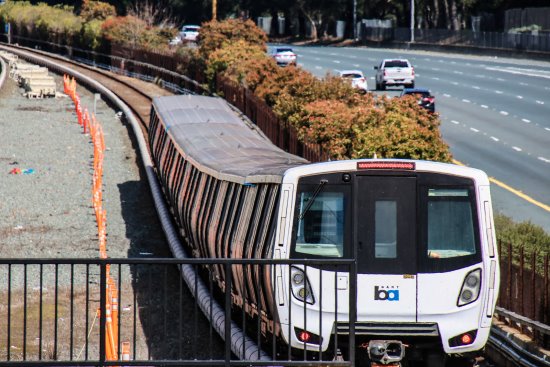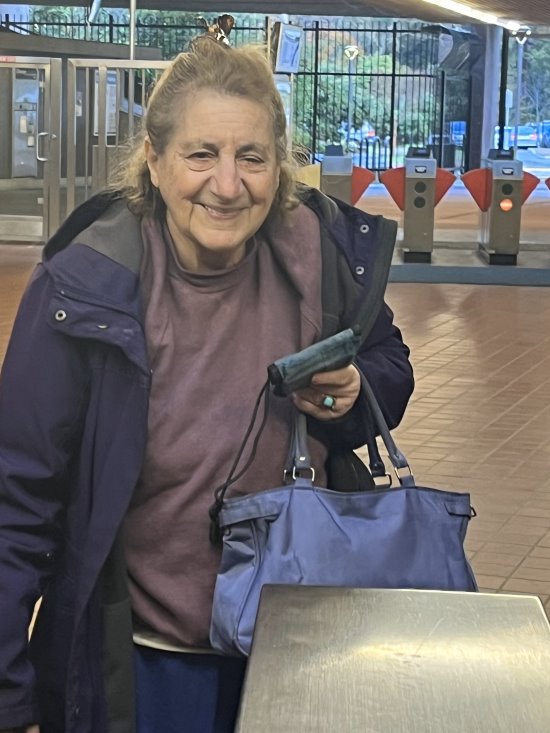 |
|
|
Photo Sora O'Doherty
|
|
|
|
|
|
Lafayette BART Station and the path that connects it to Town Center Apartments, downtown shops, restaurants, and Walgreens is a place that is frequented by commuters on their way to and from work, those on a night out in another part of the Bay, and unhoused people. Spend a little time in the area, and you’re bound to see police patrolling, stopping, questioning, and occasionally chasing someone.
Five years ago, 18-year old Nia Wilson and her sisters got on the BART (Bay Area Rapid Transit) three stops down from Lafayette at the Concord Station for what would be her last time. John Lee Cowell, who was 29 at the time and three months out of treatment at a mental health facility, boarded the same train and stabbed and killed Wilson and injured her sister during a transfer stop at MacArthur Station. Shortly after, the beginnings of the pandemic kicked in, forcing many to pivot to remote work. Now, BART’s ridership is at 43 percent of its pre-pandemic numbers and many are citing safety concerns as a deterrent.
In 2021, after hearing from youth who had experienced, witnessed, or feared gender-based violence while riding public transportation, BART partnered with the Girls Alliance and Unity Council to roll out a bystander intervention initiative called 'Not One More Girl.'
Alicia Trost, Chief Communications Officer for BART, says, 'Not One More Girl' has the capacity to benefit everyone – not just girls. It is however rooted in the lived experiences of youth. “Alliance for Girls brought us a report showing that youth in the Bay Area were frightened to ride BART because of cat calls, leering, staring, and following – not just on the train or on buses but on the way to take public transit. Some people weren’t going to school or work because of it,” Trost recalls.
With the input of youth, BART has responded with a comprehensive plan that includes policy and protocol changes, as well as a bystander campaign, which comes with business card size intervention cards. It’s also cleaned up and modernized its cars and added messaging about safety. “When we make the trains safer for girls and women, we’re making them safer for everyone,” Trost says. She described how the intervention cards can be used by anyone. “We saw this as an opportunity to talk to people about bystander intervention,” she added.
BART's bystander cards are available from station agents. One says “You got me? Someone is harassing me right now,” and the other says “I got you. Do you need someone to stand with you right now?’ Both cards list BART and community resources, as well as a four step process for offering support to the impacted person.
“The idea is that if someone is harassing you, you can slip someone the card right now without saying anything and get support,” Trost says.
To access the safety bystander cards, riders must approach the station agents and ask for them, and in some cases, be prepared to explain them. One of the two agents at Lafayette Station was immediately able to provide the cards. Agents at Rockridge, MacArthur, and Ashby were able to provide the cards after getting an explanation.
Lili, a rider enroute from Lafayette to 19th Street Station, says she’s become extra cautious since witnessing a chaotic situation she believes was drug induced years earlier. “I only ride on my own during daylight hours,” Lili explains. “If these cards were available near the entrance where we insert our tickets, people would use them. I would.”
74 year old Lafayette resident Lenora Jacob had no idea about the bystander program or cards, but proudly takes the BART at least twice a week to the very same station where Nia Jacobs began her last ride. “I wish there were more people on the BART train,” Jacob says, while describing the decline in passengers she’s observed after riding for three decades. “I feel safe on the BART. The new trains are nice and clear. Nobody bothers me. I try to talk to somebody. I think more people should ride.”
33-year old Brandi Green has been riding the train her whole life and she’s never seen the bystander cards or noticed the billboards advertising the ‘Not One More Girl’ initiative. “A lot of times I notice, people don’t help,” Green said. “We’ve all gotten a little antisocial since the pandemic. Hopefully people can grow back into wanting to be around each other and help each other.”
Green says that while incidents like the recent Orinda derailment and mentally unwell people who she’s witnessed taking out their frustrations on passersby concern her, they won’t stop her from riding. “I don’t have a car and didn’t grow up with one, so I’ve always used BART. I’m vigilant. I sometimes wear earphones and I’m always aware of my surroundings. I carry pepper spray and a knife, but I’ve never had to use it,” Green says. “I have heard some terrible situations happen with not just girls and women, but also men, so I think if we can have inclusive messaging saying ‘I got you’ no matter who you are, it’ll be good. I think it’s important that we look out for each other.”
A BART Station Agent, who identified only as Robert, has been on the job for 16 years. He says he’s not surprised by some riders feeling more afraid than they used to because agents are also afraid. “We deal with a lot in an eight hour day. There are a lot of mental health issues, some drug use, and things are unpredictable,” Robert explains as someone jumps the entrance without paying. “I have seen people really scared and at times, have offered to stand with them until their train arrives. I think the intention behind the cards is really good. I do see the ads and the billboards but I’m not sure how many people pay attention to them and I’ve never had anyone really ask for the cards.”
When asked what ideas he had to get more cards in peoples hands, Robert suggests signage on the windows of the agent booth telling BART riders to ask for them or a small dispenser.
What can riders take from this? Initiatives like ‘Not One More Girl’ and bystander intervention methodologies like the “You got me?” “I got you” card campaign have the capacity to make a difference.
|

